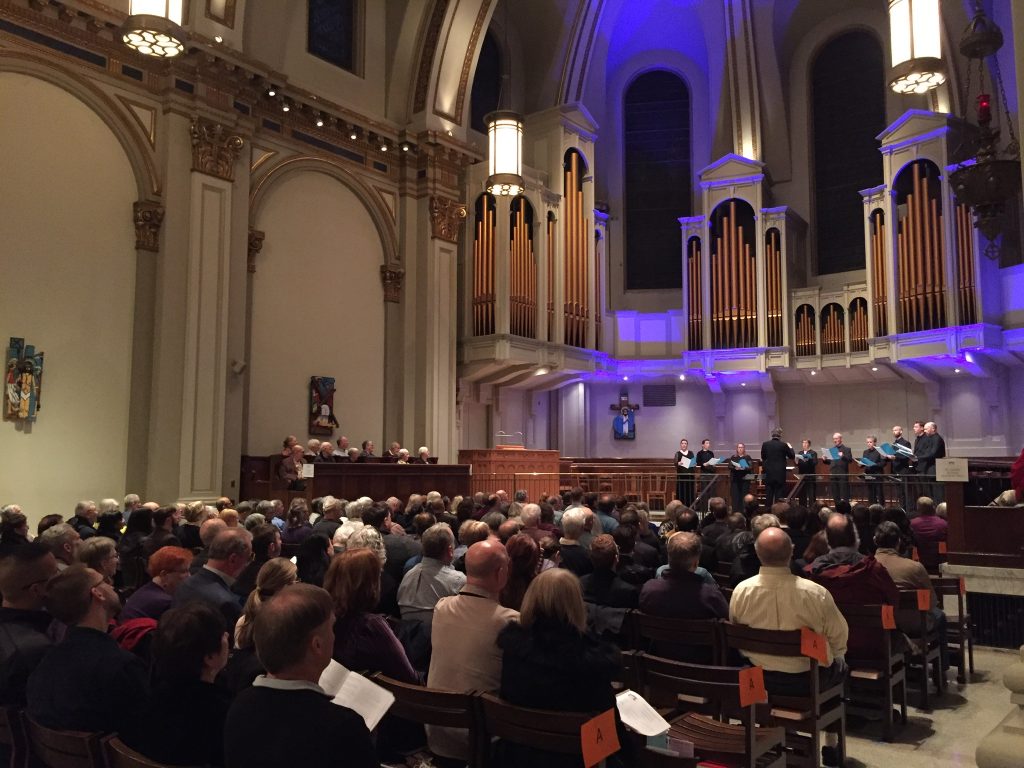By Philippa Kiraly, Special to the Sybaritic Singer
It’s always a red-letter day when The Tallis Scholars makes one of its rare visits to perform in Seattle, and St. James Cathedral is the perfect venue for its purity of sound and harmony, enhanced by the resonance of the space.
Founded 46 years ago by then Oxford undergraduate Peter Phillips and still directed by him, the small group of ten singers was there Saturday night, presented by Cappella Romana in a performance of Renaissance works from the Vatican’s Sistine Chapel.
Phillips’ life interest has been Renaissance choral work and how to achieve the clean vocal tones which create perfect harmony when combining the different lines in Renaissance polyphony. And, of course, the expressivity wanted by the composers.

This program of sacred music was anchored by the music of Palestrina, born 1525, 160 years before Bach. Phillips chose excerpts from five different Palestrina masses to anchor the program, spacing each through the program interspersed with the music of other composers (many from an earlier generation). Many of these are hardly known outside the scholarly realm, such as Cristobal de Morales, Costanzo Festa and Elzea Genet Carpentras, largely because the Papacy chose to prevent any dissemination of much of the Sistine Chapel’s music. Two composers in the second half of the program are better known: France’s Josquin des Prez, the earliest composer on the program, and Gregorio Allegri, the latest (except for the only modern composer, Alexander Campkin) whose famous “Miserere” we might not know now had it not been for a precocious Mozart, who heard it in 1770 on a visit to the chapel and transcribed it by ear.
All the works on the program were unhurried, the beauty of each unfolding line creating the interweaving harmonies, and given a lingering sound hanging in the air due to the cathedral’s resonance, though not enough to blur the lines. Much of the music was in four or five parts, some for double choir, though Festa’s delicate, ethereal “Quam Pulchra es” was sung with just three sopranos and a tenor, while Carpentras’ Lamentations created its solemnity with lower voices: two altos, two tenors and two basses.
Palestrina’s soaring “Credo” was succeeded after intermission by the also soaring Allegri “Miserere,” made famous not only for its glorious music but for the high Cs which a solo soprano repeatedly lifted to the vaults of the cathedral ceiling. Phillips made use of the length of the cathedral here, with four singers in the west organ loft, five with him at the east end, and a tenor soloist by the altar in the middle, singing the opening phrase to each section.
An enlightening addition to the program was the commissioned “Miserere” which the Scholars requested from young British composer Campkin. Like the Allegri, his work is for double choir, and creates the same atmosphere with very different musical ideas. The singers were again divided, one group each end and one by the central altar. Campkin uses a low drone sound much of the time, adding higher voices gradually from the start, often with singers in close harmony, which could in other cases seem like clashes but here don’t because of the way the voices move in and out and the overall supplication of the piece, without demanding, just a request for forgiveness. The work fit seamlessly into the overall program.
The concert left this listener and, it seemed, most others, with a sense of serenity and peace.
 Philippa Kiraly has writing classical music criticism since 1980, for several newspapers in northern Ohio and Seattle, magazines, both local and national, and blogs. She is passionate about the importance of independent criticism for the fine arts, an art in itself which is dying with little interest by many publications and no longer a viable career for most. But writing for tickets is always worthwhile!
Philippa Kiraly has writing classical music criticism since 1980, for several newspapers in northern Ohio and Seattle, magazines, both local and national, and blogs. She is passionate about the importance of independent criticism for the fine arts, an art in itself which is dying with little interest by many publications and no longer a viable career for most. But writing for tickets is always worthwhile!
Pippa is a keen gardener, a keen grandparent, and can get lost in a good book.

Thanks for the lovely words reminding of a beautiful concert. Are there any other photos of that evening you could share?
I missed their return last week as I am quarantined ahead of hip surgery.
Blessings…